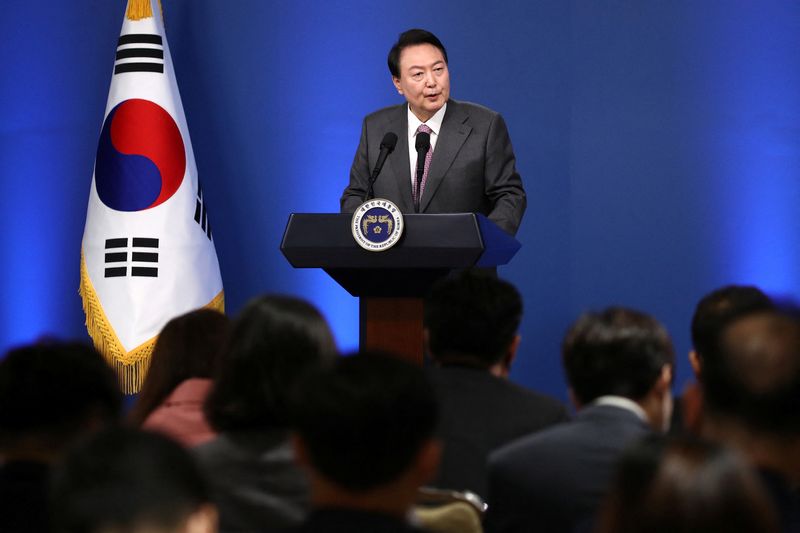By Hyonhee Shin
SEOUL (Reuters) -South Korean President Yoon Suk-yeol said on Tuesday that North Korea has nothing to gain from nuclear weapons, as the isolated country threatened to beef up its capability to attack its southern neighbour.
"North Korea is consistently developing and upgrading its nuclear weapons and posing nuclear threats to not only our Republic of Korea but the world," Yoon told reporters, referring to South Korea by its official name.
"I believe it has nothing to gain from nuclear weapons."
On Monday, North Korea's state media KCNA said leader Kim Jong Un had guided nuclear tactical exercises targeting South Korea over the past two weeks in protest over recent joint naval drills by South Korean and U.S. forces involving an aircraft carrier.
A recent flurry of missile tests was part of those exercises, designed to simulate showering the South with mock nuclear warheads, KCNA said.
Yoon said he would build robust capabilities to counter the North's threats through the U.S. alliance and trilateral security cooperation including Japan.
North Korea's increasingly explicit nuclear threats has fanned a furore in Seoul, with some politicians and scholars calling for redeploying U.S. tactical nuclear weapons.
Yoon had advocated the redeployment during the election campaign before backtracking later. He said he was now listening to various opinions in Seoul and Washington but declined to comment further.
The chief of South Korea's progressive main opposition has accused Yoon of pursuing a "pro-Japan defence policy" which he said might end up stationing Japanese military forces in South Korea. Military cooperation with Japan is a sensitive issue due to the resentment over Japan's 1910-45 colonial rule.

When asked about the opposition chief's remarks, Yoon said his concerns cannot be "justified in the face of nuclear threats," without elaborating.
North Korea has launched an unprecedented number of missile tests this year. On Sunday it fired two missiles, the seventh test since Sept. 25, and last week it fired a ballistic missile that travelled further than ever before, sending it soaring over Japan for the first time since 2017.